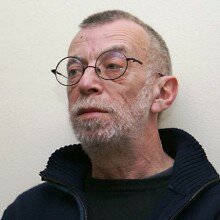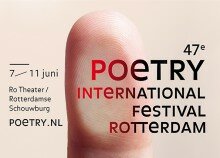Nederlands ►

Poet, performer and columnist Lev Rubinstein (Moscow, 1947) is one of the founders of Russian conceptualism. With his passionate social engagement and nuanced personal statements, he is a role model for the young avant-garde. Pussy Riot poses for snapshots on his side, and his blogs and Facebook posts unleash a flood of responses.
In interviews, he advocates equal rights for minorities, the release of political prisoners and the cessation of armed violence. In his own words, Rubinstein is resentful of the current regime, which seems to uphold the standards and values of the criminal circuit and the secret services, for ‘aesthetic reasons’: ‘They regard any sign of goodwill, any concession, as a weakness . . . Words like generosity and mercy sound foreign to them’. Via social media, Rubinstein urges abstainers to attend protest meetings because of ‘something that sometimes, and only by approximation, can be called conscience’.
The same unwillingness to play with empty concepts is characteristic of his poetry. In the 1970s, he resorted to writing with only punctuation, suggesting silences with various connotations. The punctuation marks were written on little cards, identical to those in library catalogues. Rubinstein’s ‘note-card library’ was born.
Minimalistic stacks were followed by sets with texts such as, ‘Attention! Message follows’, or sentences on different topics:
Oysters vary in number. What, you didn’t know that?
42.
You should have taught him good manners earlier. It’s too late now.
43.
Ideally, by Wednesday. Thursday is the absolute deadline.
Such poems, often named after a famous work of art or scientific concept are symphonies in cacophonous disguise, in which the disorderly choir of everyday life clashes with solemn interludes or demands for reflection:
QUIET!
56.
Kind of a man. He kind of loves. He kind of suffers.
He kind of speaks. He kind of breathes. He kind of lives.
These platitudes are no match for individual expression, which, however ludicrous, manages to characterize a person without violating their privacy. Rubinstein's poems are therefore a fine place to inhabit.
Anyone searching in the clamour for the poet's personal revelations will notice the absence of certain registers, like violence or obscenity, favoured by many an underground artist, and is sporadically rewarded with a reminiscence:
...This I remember well: the sleepy kitchen,
and soapy water coming to a boil...
63
would be half-opened on occasion...
64
...And how those blessed years passed
against the records’ hiss and crackle...
65
...And how the oil lamp’s pallid fire
was covered by a murky glass...
66
...was covered by a murky glass.”
* All poems quoted here in English translation can be found in the Compleat Catalogue of Comedic Novelties (Ugly Duckling Presse, 2014).
Bibliography
From The big note card library: A little night music, Mama washes the windows, The rise of a hero, Moscow, 1992
Farther and farther, Moscow, 1995
Regular writing, St. Petersburg, 1996
Incidents from the language, St. Petersburg, 1998
Domestic music-making, Moscow, 2000
Running after your hat and other texts, Moscow, 2004
Scents of time, Moscow, 2007
Vocabulary, Moscow, 2008
Attention symbols, Corpus, Moscow, 2012
Probably, Moscow, 2013
In English
Compleat Catalogue of Comedic Novelties, trans. Philip Metres and Tatiana Tulchinsky, Ugly Duckling Presse, New York, 2014
Rubinstein’s work has been translated into English, French, German and Swedish.


